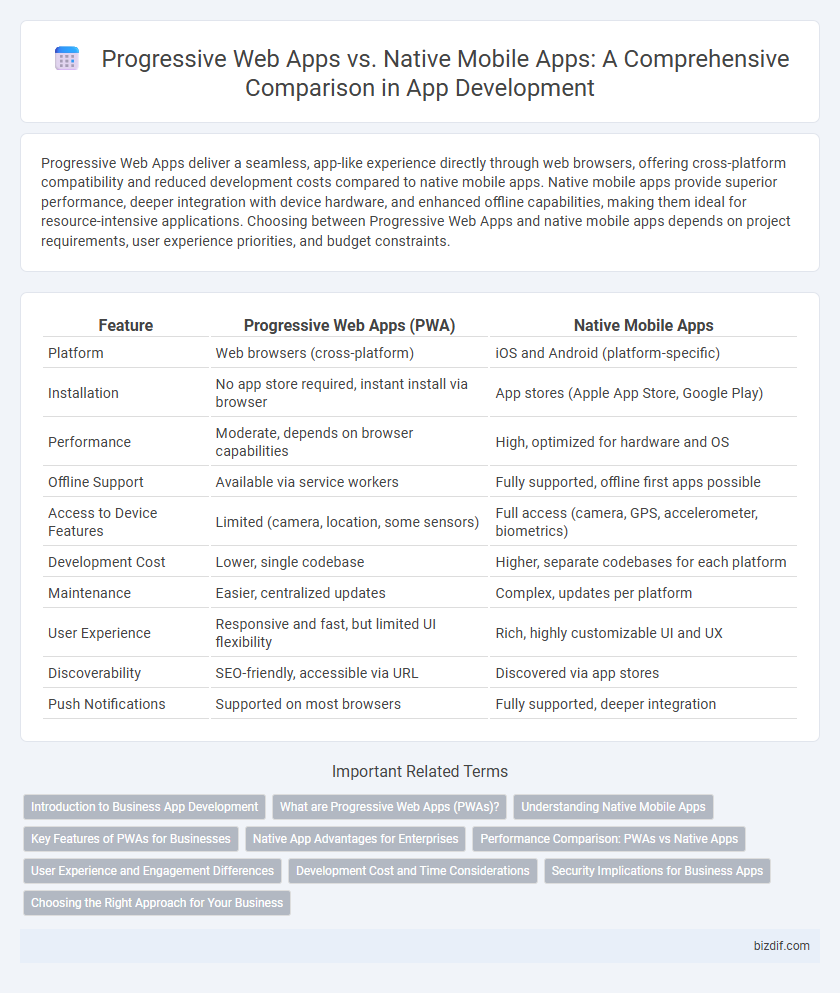Progressive Web Apps deliver a seamless, app-like experience directly through web browsers, offering cross-platform compatibility and reduced development costs compared to native mobile apps. Native mobile apps provide superior performance, deeper integration with device hardware, and enhanced offline capabilities, making them ideal for resource-intensive applications. Choosing between Progressive Web Apps and native mobile apps depends on project requirements, user experience priorities, and budget constraints.
Table of Comparison
| Feature | Progressive Web Apps (PWA) | Native Mobile Apps |
|---|---|---|
| Platform | Web browsers (cross-platform) | iOS and Android (platform-specific) |
| Installation | No app store required, instant install via browser | App stores (Apple App Store, Google Play) |
| Performance | Moderate, depends on browser capabilities | High, optimized for hardware and OS |
| Offline Support | Available via service workers | Fully supported, offline first apps possible |
| Access to Device Features | Limited (camera, location, some sensors) | Full access (camera, GPS, accelerometer, biometrics) |
| Development Cost | Lower, single codebase | Higher, separate codebases for each platform |
| Maintenance | Easier, centralized updates | Complex, updates per platform |
| User Experience | Responsive and fast, but limited UI flexibility | Rich, highly customizable UI and UX |
| Discoverability | SEO-friendly, accessible via URL | Discovered via app stores |
| Push Notifications | Supported on most browsers | Fully supported, deeper integration |
Introduction to Business App Development
Progressive Web Apps (PWAs) provide businesses with a cost-effective and versatile solution, delivering app-like experiences via web browsers without the need for separate installations. Native Mobile Apps offer superior performance and deeper integration with device hardware, enhancing user experience but requiring platform-specific development and maintenance. Choosing between PWAs and Native Apps depends on business goals, target audience, budget, and desired app functionality.
What are Progressive Web Apps (PWAs)?
Progressive Web Apps (PWAs) are web applications designed to deliver a native app-like experience on any device using standard web technologies such as HTML, CSS, and JavaScript. PWAs leverage service workers to enable offline functionality, fast load times, and push notifications, enhancing user engagement without requiring installation from app stores. These apps offer cross-platform compatibility, reducing development costs and simplifying updates compared to native mobile apps built specifically for iOS or Android.
Understanding Native Mobile Apps
Native mobile apps are specifically developed for a particular operating system using platform-specific languages like Swift for iOS and Kotlin for Android, ensuring optimal performance and seamless integration with device features. These apps provide faster load times, access to device hardware such as GPS, camera, and push notifications, and superior user experience compared to web-based solutions. Due to their direct interaction with the OS, native apps enable offline functionality and deliver high security standards essential for sensitive user data.
Key Features of PWAs for Businesses
Progressive Web Apps (PWAs) offer businesses key features such as offline usability, push notifications, and fast load times powered by service workers, enabling seamless user engagement without relying on app stores. PWAs provide device-agnostic accessibility through responsive design, ensuring consistent performance across desktops, tablets, and smartphones. This approach reduces development and maintenance costs, accelerating time-to-market compared to native mobile apps.
Native App Advantages for Enterprises
Native mobile apps offer enterprises superior performance and seamless integration with device hardware like cameras, GPS, and biometric sensors, enhancing user experience and functionality. They provide robust security features and access to platform-specific APIs, enabling tailored solutions critical for business operations. Furthermore, native apps facilitate offline access and faster response times, increasing reliability and user engagement for enterprise workflows.
Performance Comparison: PWAs vs Native Apps
Progressive Web Apps (PWAs) offer near-native performance by leveraging modern web technologies like service workers and WebAssembly, which enable offline functionality and fast load times. Native mobile apps, developed specifically for iOS or Android, generally provide superior performance due to direct access to device hardware and optimized APIs. While PWAs excel in cross-platform compatibility and ease of updates, native apps consistently deliver smoother animations, lower latency, and better integration with system-level features.
User Experience and Engagement Differences
Progressive Web Apps (PWAs) provide seamless user experiences through fast loading times, offline functionality, and automatic updates, enhancing engagement across multiple platforms without installation barriers. Native Mobile Apps deliver superior performance, deeper device integration, and richer user interfaces tailored to specific operating systems, resulting in higher engagement for resource-intensive tasks. User retention often benefits from native app push notifications and smoother animations, while PWAs offer easier access and shareability, balancing engagement strategies based on development goals.
Development Cost and Time Considerations
Progressive Web Apps (PWAs) typically offer lower development costs and faster time-to-market due to their single codebase, which runs seamlessly across multiple platforms like iOS and Android. Native mobile apps require separate development for each platform, increasing both time and financial investment significantly. Businesses aiming for rapid deployment with budget constraints often prioritize PWAs over native apps for cost-effective scalability.
Security Implications for Business Apps
Progressive Web Apps (PWAs) offer enhanced security through HTTPS encryption, service worker caching, and sandboxed execution environments, reducing risks of data breaches in business applications. Native mobile apps provide deeper integration with device security features such as biometric authentication, hardware encryption, and secure storage, which can be crucial for protecting sensitive corporate information. Businesses must weigh the security benefits of native code access against PWAs' streamlined update process and consistent security patch deployment when choosing the optimal app development approach.
Choosing the Right Approach for Your Business
Progressive Web Apps (PWAs) offer cross-platform compatibility and faster development cycles, ideal for businesses targeting broad audiences with limited budgets. Native mobile apps deliver superior performance, access to device-specific features, and enhanced user experiences, making them preferable for enterprises requiring advanced functionalities and high engagement. Evaluating project goals, target users, budget constraints, and required app capabilities is crucial for selecting the optimal development approach.
Progressive Web Apps vs Native Mobile Apps Infographic

 bizdif.com
bizdif.com